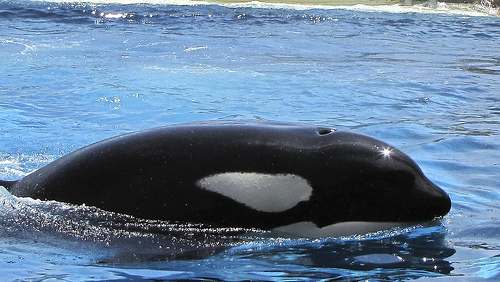Lauren Sophie Kearney

Photo: guessthree
Have you ever, even once, wondered how it would feel to live in a bathtub?
Most likely, that thought has never crossed your mind. The concept of it is just unthinkable. For some killer whales, however, it is reality.
A few nights ago, I watched the new documentary, Blackfish. It focuses on Tilikum, a killer whale in captivity, responsible for the deaths of three people.
Tilikum lives at Sea World, along with other Killer Whales, and has been living in captivity for thirty years. The truth is, Tilikum is no monster. As we can see clearly from this documentary, he lives in a tiny tank and is forced to perform grueling tricks day in and day out.
According to WDC (Whale and dolphin conservation), “wild whales can swim up to 100 miles a day”, whereas in captivity, they have limited space. Their life line is also shortened in captivity, most living up to 10 years, as opposed to in the wild where they can live up to 90 years.
Some die from stress, others from the contaminated waters and some choose to take their own lives by hitting their head against the pool. From this unnatural existence, how we can expect anybody to go through this without psychological scars?
Killer Whales are majestic creatures with complex emotions. After reading up on Killer Whales, I discovered that their emotions are not much different to ours.
Right from the start, they are torn away from their family, leaving both the whale itself and the family, emotionally scarred forever. It is not any different to kidnapping a human child from its mother. The family of killer whales literally cry out for their baby that is stolen away from them. It is an incredibly traumatic process right from the very beginning.
The executives at Seaworld and other various sea parks are dictators. They take pleasure in earning billions from these helpless animals. Each whale is merely an object to them, easily replaceable.
The power they are exerting over these killer whales isn’t inspiring, though, nor is it intimidating. It is easy to dictate to an animal. Personally, the brave human beings out there standing up for those without a voice inspires me. I like to think of myself as one of them.
One of the best things you can to do aid this issue is to not go to SeaWorld and other similar sea parks. Another way to help is to create awareness of this crucial issue. Spread the word and let it be heard!
Will these imprisoned animals ever go back to the freedom they deserve? With the public’s persistence and dedication, we might be able to make a change and make an impact on the lives of captive killer whales like Tilikum.











No comments so far ↓
Nobody has commented yet. Be the first!
Comment